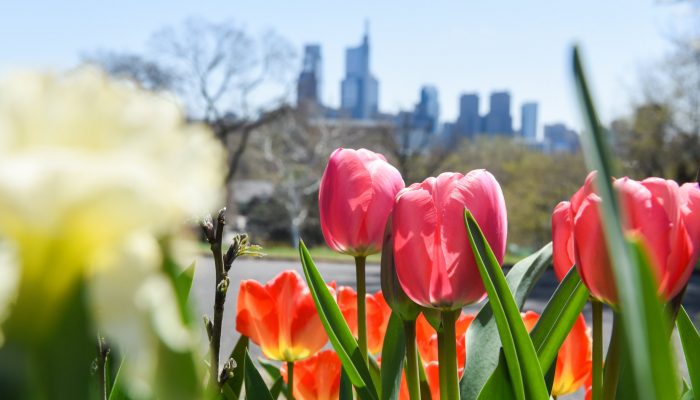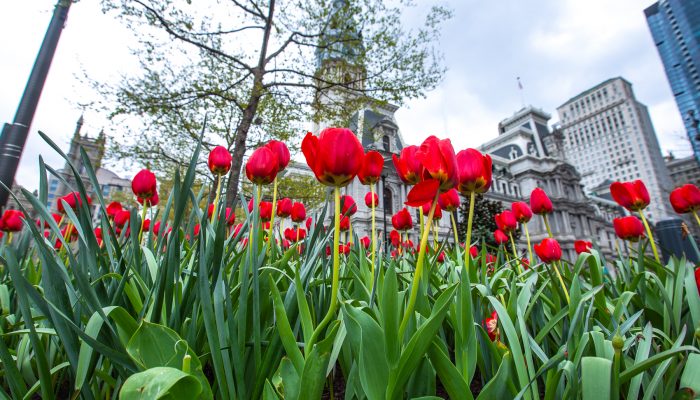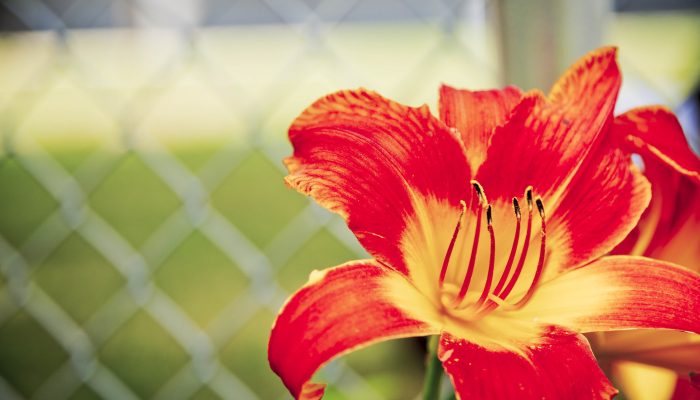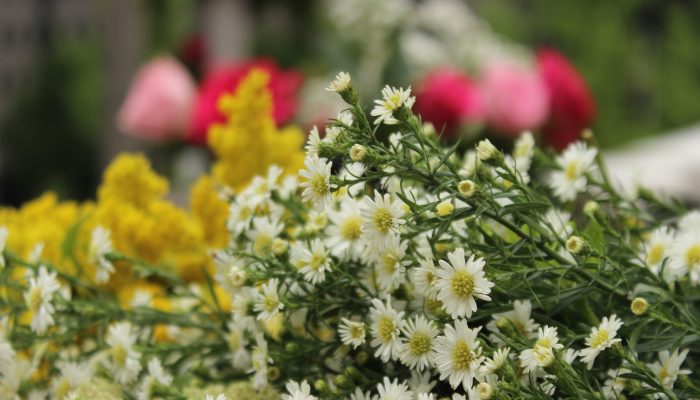This post was written by Rev. Naomi Washington-Leapheart, Director for Faith-Based and Interfaith Affairs, Office of Public Engagement
This season is often an important time of transition, reflection, and refreshment to many of us. The springtime as well includes a host of major religious holidays:
- Passover, which begins April 8, and ends on the evening of April 16, is the 8-day Jewish festival that commemorates the emancipation of the Israelites from enslavement in ancient Egypt. The main ritual of Passover is the seder – a festive meal that involves the re-telling of the Exodus through stories and song and the consumption of ritual foods.
- Holy Week, which began on April 5 with Palm Sunday and ends on Easter Sunday, April 12), contains vitally important days in the life of Christian churches, as they reflect and remember Jesus’ final days – his betrayal, his last meal (Maundy Thursday), his arrest, his death (Good Friday), his burial, and his resurrection.
- Towards the end of April, probably on the 23rd but the date may vary according to the cycle of the moon, Muslim communities in our city will begin Ramadan, the the holiest month of the Islamic calendar. This period represents a time to fast and devote a particular focus to prayer, purification, and charitable acts.
It is sobering to acknowledge that these holy days must be observed within the context of deeply challenging circumstances. How can we share seder meals when we can’t sit at the same table? How can we engage in the ritual of footwashing on Maundy Thursday if we cannot touch each other? How can we celebrate the breaking of the fast with feasting and prayer if we cannot gather for Eid? It is difficult to comply with these emergency health orders, which apply to religious and non-religious places alike, especially now.
Since Passover and Holy Week/Easter are this week, here is some special guidance we have gathered after consulting with members of Jewish and Christian communities as you seek to observe these important holidays while maintaining your safety and health. We reiterate that these are examples and guidance only.
Ramadan Guidance Provided by The Philadelphia Ramadan & Eid Fund
The holy month of Ramadan is the ninth month of the Islamic lunar calendar. It is meant to be a time of spiritual rejuvenation and deep contemplation of one’s relationship with God. During the entire month, Muslims commemorate the revelation of the Qur’an and fast every day from dawn to sunset.
Ramadan and COVID-19
- The need to maintain social distance due to COVID-19 means that Muslims will not be able to congregate in the mosques during Ramadan as they normally would.
- They will also not be able to eat in the large groups that are typical of this month.
The Muslim community in Philadelphia is cooperating to make sure that all Muslims have something to eat at sunset and that they do not feel isolated because of this situation.
The most important aspect of Ramadan, increasing God-consciousness, can be attained despite social distancing limitations. In fact, in many ways, Muslims may find this to be an opportunity for great spiritual growth. As long as they endure this trial patiently, Muslims believe that they will have a special reward from God.
Eid Al-Fitr Meals on Wheels & Family Fun
In light of the coronavirus pandemic, the Philadelphia Ramadan & Eid Fund has made the tough decision to cancel the “Philly Eid in the Park Festival,” the city’s largest Eid convening, attended last year by over 15,000 Muslim community members.
The organization has designed an alternative experience for families through their new “Eid Al-Fitr Meals on Wheels & Family Fun” program. On Saturday, May 30, the Philadelphia Ramadan and Eid Fund will provide 100 families with dinner catered by Southside Zabihah Halal Eatery, along with a personalized gift basket. Registration will open on Friday, April 24. For more information and periodic updates, follow Philly Eid in the Park Festival on social media (@phillyeidintheparkfestival) or email contact@phillyeidinthepark.org.
Rabbi Adam Zeff from Germantown Jewish Centre offers this short message for Passover 2020 (read a more detailed message from Rabbi Zeff here):
Dear friends,
Every Pesach is different, but we approach the Passover season this year in extraordinarily difficult times. The story of the Exodus from Egypt asks us to identify ourselves with the suffering of the Israelites, filled with anxiety, fear, and distress, worried for their families and for their lives. This year more than any in recent memory that identification rings true. But the Jewish people have celebrated this Festival of Freedom in difficult circumstances before, and we will manage to do so this year as well!
Tips on organizing a seder in the time of COVID-19
- Following the guidance of public health authorities, we should not gather physically even in small groups except for household members.
- There are wonderful haggadot that you can order online on websites like haggadot.com, where you can create your own personalized haggadah to download or print.
Cleaning our houses
- The Torah states that we should remove all leaven from our houses before Passover, but this is not the first time that Jews have worried about the easy availability of food. The ancient rabbis came up with an alternative: setting our leavened goods aside and “selling” them for the duration of the holiday. I urge everyone to take advantage of this process of selling hametz this year.
- The ancients taught that when we are searching for hametz in our houses we should use a candle because its light is poor. They are encouraging us both to go easy on ourselves in our cleaning and to concentrate on the spiritual meaning of the holiday.
Passover foods
- We should remember that generations of Jews celebrated the holiday with only a few special foods. The 2020 Rabbinical Assembly Guide to Passover has very good guidance about the many foods that can be bought without special kashrut certification.
- Although we typically eat a lot of matzah during Passover, the positive mitzvah to eat matzah only actually applies at the seder. So we can get by on much less matzah if necessary.
Seder night
- Although we may be physically separated from those we love, consider using technology to bring them into your home. This might involve connecting with family before candle lighting or even holding an entire Zoom seder!
Every Passover is different. Despite all that we are going through, may we find our way through from slavery to freedom again this year, supported by everyone around us and by our wonderful community. Hag sameah!
To Christian communities in Philadelphia who are looking to observe Maundy Thursday, Good Friday, Holy Saturday, and Easter Sunday.
- Many Christian denominations have issued COVID-19 guidance. Please check the websites of your connectional organizations, adjudicatories, and associations for ideas about how to theologically and logistically adapt your services.
- Maundy Thursday offers an opportunity to serve the members of your household with humility and gratitude. Good Friday offers a moment to grieve those who have suffered and died among us, particularly those whose deaths reflect the injustices in our society. Easter Sunday provides the hope we need to know that we will emerge from this difficult time – we may wear the scars of this season, but we will live again, hopefully transformed. Try something new as you connect the messages of Holy Week to this present moment.
Direction and guidance for all faith communities
- Please, do not gather in-person.
- Please do NOT gather clergy, musicians, singers, and other lay members to conduct worship for a livestreamed audience.
- Please do not re-arrange your space to accommodate 6 feet between seats. Any group of any size carries risk of transmitting the coronavirus. Even if you reduce the group of people who are coming to your house of worship to 25 or 20 or 15, there is still risk involved. The virus can spread among a small group of people who are sharing microphones, singing in the same room, and touching the same surfaces, even if people do not have symptoms. Remember, no risk is better than minimal risk.
- Zoom offers an easy-to-use digital space to gather your congregation so that you can see and hear each other. Some Zoom plans also allow you to simultaneously livestream to YouTube and/or Facebook. Zoom guides written by congregational leaders can be found here and here.
- Remember that a different service doesn’t mean a deficient service. It may not be feasible to export your entire in-person worship – element for element – to an online platform. Consider pre-recording songs or having one person lead music on a phone call or Zoom session.
- Although we cannot embrace in person, we can still extend ourselves to each other in loving and tender ways. Consider using mass text apps like Pastor’s Line to communicate important messages or prayer requests with your congregation.
The Chaplaincy Innovation Lab has published a Spiritual Care Resources for Religious Holidays Guide, and Interfaith Philadelphia has offered a digital COVID-19 Pandemic Interfaith Resource Guide. These may be helpful as you plan and can connect you to other faith communities who are also navigating this crisis.
This is a time to imagine and innovate. Our faith communities need not worship less, but they must worship safely.
If you need more support or to join our weekly call for faith leaders at 11 a.m. on Wednesdays, please email Rev. Naomi Washington-Leapheart, Director for Faith-Based and Interfaith Affairs, at FaithPHL@phila.gov with your questions or concerns.
We are still hosting prayer pauses every Friday, Saturday, and Sunday at 3 p.m. on the Mayor’s Office of Public Engagement Facebook page.




